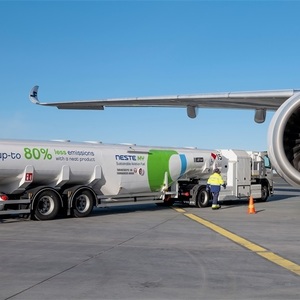Neste, Airbus join forces to advance the use of 100% SAF

November 30, 2022
BY Neste Corp.
Neste and Airbus have signed an agreement to advance the use of sustainable aviation fuel (SAF) within the aviation sector. Both parties share a vision that SAF is a key solution to helping reduce greenhouse gas emissions of air travel. This collaboration aims to accelerate the aviation sector’s transition to SAF.
Reaching the aviation industry’s ambitious “net zero carbon emissions by 2050” goal, requires different measures to be deployed, including fuel-efficient aircraft technologies, improved operations and ground infrastructures, as well as deployment of sustainable aviation fuel.
Neste and Airbus recognize that one of the biggest challenges in accelerating SAF use is the ramp-up of SAF production. This collaboration is laying the foundation for Airbus and Neste to explore business opportunities together and jointly promote the production and use of sustainable aviation fuel. The focus will be on the technical development of SAF, fuel approval and testing of current and future production technologies, and investigating how "100 percent SAF" use can be enabled.
“Neste is at the forefront of accelerating the aviation sector’s journey to a more sustainable future. That journey requires cooperation across the industry’s value chain. This collaboration with Airbus connects a pioneer in the aerospace industry with a leader in renewable fuels. The combined knowledge and expertise of the companies will help advance the use and availability of SAF as a means of transitioning aviation towards more sustainable energy sources and reducing the climate impact of aviation,” said Thorsten Lange, Executive Vice President, Renewable Aviation at Neste.
“At Airbus, we believe SAF is one of aerospace’s most promising decarbonization solutions that can be used in both in-service aircraft fleets and those of tomorrow. We are proud to partner with Neste and drive forward the development and uptake of SAF, stimulating the creation of a commercially viable market for renewable aviation fuels,” says Julie Kitcher, executive vice president of communications, sustainability and corporate affairs at Airbus. “All Airbus aircraft are already certified for flying with up to 50 percent SAF, and this partnership will be instrumental to reaching certification for 100 percent SAF by the end of the decade.”
The agreement between Neste and Airbus builds on the cooperation in the ECLIF3 research project, the world’s first in-flight emissions study using 100 percent SAF on a wide-body commercial passenger aircraft, with Rolls-Royce and German research centre DLR. Following the collaboration in the ECLIF3 project, Airbus and Neste will be further working on the technical aspects of the challenge to reach the 100 percent SAF certification.
SAF delivers the performance of conventional jet fuel but with a significantly smaller carbon footprint on a life cycle basis. Using Neste MY Sustainable Aviation Fuel reduces greenhouse gas emissions by up to 80 percent* over the fuel’s life cycle compared to using fossil jet fuel. Neste MY Sustainable Aviation Fuel is produced from sustainably sourced 100 percent renewable waste and residue raw materials, including used cooking oil and animal fat waste. Prior to use, SAF is blended with conventional jet fuel and works seamlessly with existing fueling infrastructure and aircraft engines.
*) When used in neat form (i.e. unblended) and calculated with established life cycle assessment (LCA) methodologies, such as CORSIA methodology
Advertisement
Advertisement
Related Stories
CountryMark on July 22 celebrated the completion of more than $100 million in upgrades at its refinery in Indiana, including those related to soybean oil storage. The facility produces renewable diesel via coprocessing technology.
ATOBA Energy and Air Moana are partnering to implement scalable solutions for the supply of SAF. The collaboration aims to ensure long-term SAF availability while supporting local initiatives to develop sustainable fuel production in Tahiti.
Neste Corp. on July 24 released second quarter results, reporting record quarterly renewable product sales volumes despite weaker margins. SAF sales were up nearly 80% when compared to the first quarter of 2025.
Valero Energy Corp. on July 24 released second quarter results, reporting a profitable three-month period for its ethanol segment. The renewable diesel segment posted a loss, but the company’s new sustainable aviation fuel (SAF) unit operated well.
The IRS on July 21 published a notice announcing the 2025 calendar-year inflation adjustment factor for the Section 45Z clen fuel production credit. The resulting adjustment boosts maximum the value of the credit by approximately 6%.
Upcoming Events










